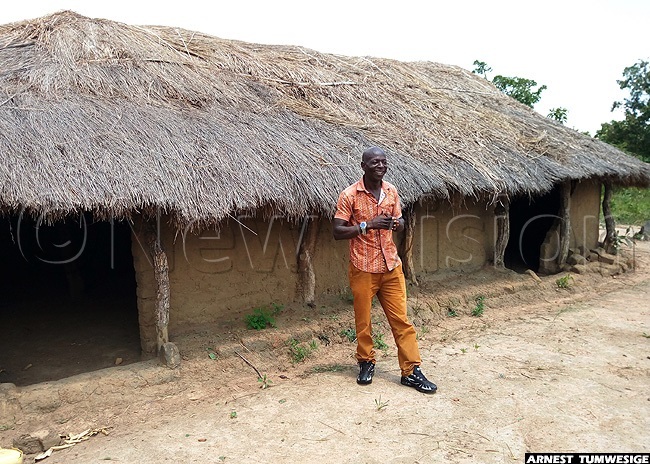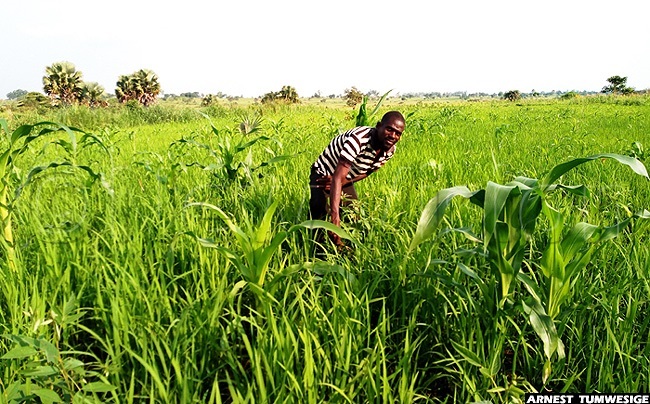The ex-inmates determined to improve their lives
After spending 21 years behind bars for murder, a 45-year-old pastor in northern Uganda has resolved to put his past behind him to focus on the future.
LIFE AFTER PRISON
The livelihood for ex-inmates who were recently released after completing their sentences is progressively changing after applying the skills they learnt from prison.
Pastor Tonny Awilo Kato from Pukony Laban "A" parish, Awach sub-county in Gulu district is among those who have bought oxen and an ox-plough to carry out commercial farming.
Despite staying in prison for 21 years after being convicted for murder, the 45-year-old has put his past behind him to focus on the future.
Awilo was one of the inmates incarcerated in Amuru, Gulu and Kitgum prisons that have benefited from farming through a training conducted by Advance Afrika, an NGO that partners with the Uganda Prisons Service to rehabilitate prisoners.
When Awilo was released in September 2018, the organization empowered him with a hoe, onion seeds and pesticides to help him start a new life in the community.
"Last year, I dug an acre and planted onions. Out of that, I harvested eight bags and sold them. This earned me sh4.8m cash. I had never earned such huge sum of money. It was just too much for me," a visibly delighted Awilo tells New Vision.
After the onion harvest, he then planted okra, which he harvested, dried and sold in South Sudan, fetching him sh4.3m.
The pastor in the only church in his village - New Life Christian Centre Church - has since bought four pairs of oxen that he is using for farming. He has also bought four female calves, six goats and 46 chicken.

Father of seven Awilo has also planted six acres of soya beans and three acres of beans.
But the lockdown due to the COVID-19 pandemic has affected his market for soya beans after his potential buyer in Kampala declined to buy as earlier planned.
"This has affected my planning because I have to wait and look around for another buyer which is not easy. I had plans to support my children and build my church using the money," he says.
In a similar situation is 33-year-old Sarah Laker, who is a resident of Kirombe sub-ward, Layibi-Bardege division in Gulu.
After spending three years behind bars, Laker was released in 2016. Just like Awilo, she opted to join a business mentorship programme during her time in incarceration at Gulu Main Prison.
"I was taught how to do business by keeping my books of accounts so that I can understand daily sales and profits and spending on things that matter," she says, adding that she previously had a weakness of impulse buying.
After doing her prison time, Laker was given a basin each of dried beans, silver fish (mukene), sorghum and groundnuts to start her off. She was also given 10 empty sacks and three basins, a weighing scale and sh15,000 to kickstart her post-prison life.
The mother of four tells New Vision that since regaining freedom, her business has grown and is now valued at sh3m.
As a way of impacting others, Laker has since become a community counselor handling mainly domestic issues amongst couples.
Michael Okot, a resident of Kati Kati Village in Pabbo town council in Amuru district is another ex-convict who is now engaged in farming to improve his household income.
He was released in March 2018 after finishing his 12-year sentence in Otwee Central Prison in Amuru district. Prior to his release, Okot underwent one month of training with Advance Afrika.
With the help of a prison warder, he acquired two acres just outside the prison on which he planted cassava and beans.
The 28-year-old says he dried the cassava and sold it in South Sudan through a friend, earning him sh1.7m which he used to buy a pair of oxen for his farming.
"I pray that disciplined prisoners who are about to finish their sentences are allowed to move out and start income-generating projects when they start new lives in the community. That is what I would consider as true rehabilitation of inmates," says Okot.

Need for close monitoring
Sharon Atukunda, the executive director of Advance Afrika, says that for former inmates to thrive upon returning to the community, they need continuous mentorship support and advice.
"There is need to focus more on providing vocational skilling of inmates during imprisonment and value addition to the products and services created. This is to make them more relevant to the community."
Atukunda says that in some communities, leaders acknowledge that when the ex-inmates return home, they are faced with such challenges as post-traumatic stress disorder (PTSD), social stigmatization, and isolation caused by lack of shelter, food and housing.
Under the previous action on the Economic Empowerment and Social Reintegration of inmates implemented by Advance Afrika, in partnership with the Uganda Prisons Service, a total of 1,195 prisoners received training in entrepreneurship and life skills and small enterprise development.
Of these, 585 were from Lango and 610 from Acholi sub-region.
COVID-19 affects rehabilitation
Margaret Orik Obonyo, the Assistant Commissioner of Prisons, says that since the outbreak of the coronavirus pandemic, rehabilitation of the inmates in the nine district prisons of Acholi sub-region was halted.
At regional level, she adds, they are working out modalities that suit the standard operating procedures as directed by President Yoweri Museveni. They will also have to be approved by the Commissioner General of Prisons.
"We are only doing rehabilitation in the four farm prisons because these ones are isolated from the general public," says Obonyo.
"Before COVID-19, we used to buy weaving materials from the public to be used in the district prisons, but for fear of taking the virus inside, we stopped."
Apparently, all remanded inmates are being taken to Kitgum Main Prison from all the magisterial courts in the eight districts of Acholi sub-region. This is a measure undertaken to limit the spread of the virus.